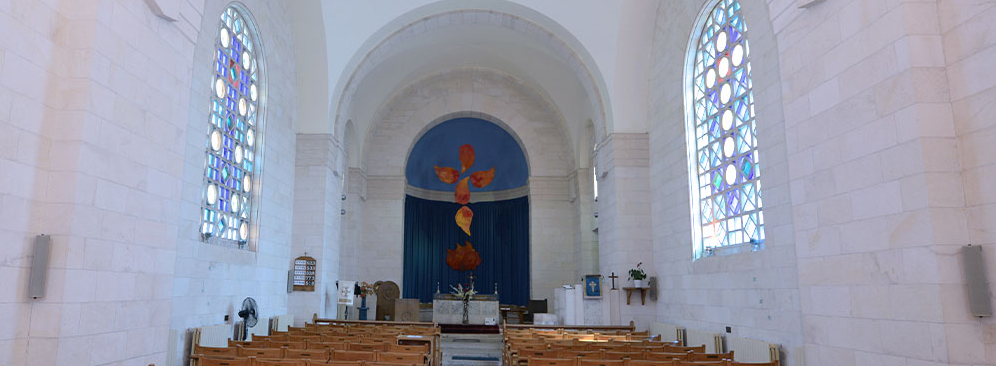Third Sunday after Pentecost, June 5 2016
1 Kings 17.8-24; Psalm 146.1-10; Galatians 1.11-24; Luke 7.11-17
St Andrew’s Scots Memorial Church, Jerusalem
Denn alles Fleisch, es ist wie Gras
und alle Herrlichkeit des Menschen wie des Grases Blumen.
Das Gras ist verdorret und die Blume abgefallen.
This is not how I usually begin a sermon. But this is how Johannes Brahms in his German Requiem renders the words of the prophet Isaiah that are more familiar to us in English: “All flesh is grass, and all the goodliness thereof is as the flower of the field: the grass withers, the flower fades.”
Words that are echoed and amplified in the first letter of Peter: “For all flesh is as grass, and all the glory of man” – all human glory – “as the flower of grass.”
*
In 1999, my wife Rowena was diagnosed with cancer. Three years later she was dead. For months afterwards, I sat alone on the sofa we used to share, listening to the German Requiem with tears streaming down my face.
Earlier in life, I had spent eleven years in rural parish ministry. I had conducted more than one funeral on the windswept and often snow-swept slopes of Scotland. I had comforted more than one widow and consoled more than one bereaved mother. Looking back on those innocent days, I realized now that as a pastor I was a complete fraud. I had no real understanding of what these women were going through. I had no idea what I was talking about.
I had lost parents and grandparents and uncles and aunts; but never before Rowena died had I lost someone who was dearer to me than life itself.
*
These memories came flooding back when I read a story published on Friday in Haaretz.
On the afternoon of May 23, Ali Mansour, a retired teacher who works as a gardener in Mevasseret Zion, was on his way home to the village of Biddu, northeast of Jerusalem. He got stuck at the Beit Iksa checkpoint, which controls access to an enclave of 12 Palestinian villages trapped behind the separation barrier near Ramallah. The checkpoint was closed.
Ali had a bad feeling.
He called his wife Najah to ask where their daughter Sawsan was. Najah didn’t know, but now she too began to worry. From opposite directions, they moved towards the checkpoint at Beit Iksa.
Writes Gideon Levy in Haaretz,“The two appalled parents stood on either side of the checkpoint, a body lying between them on the road, without being able to see or know for certain that the body was in fact that of their daughter.”
“No playwright could conceive of a grimmer, more dramatic scene: parents on the two sides of a barrier, their child’s body in a crumpled heap[1] between them.”
The truth is, says Gideon Levy, that no one knows for certain why a smiling 18-year-old, a gifted student, the daughter of a law-abiding family that has nothing to do with politics – why this young woman approached a checkpoint waving a knife.
Perhaps she was driven to put an end to her life, like many other adolescent girls, by a fleeting mood. Perhaps she was out to perpetrate a terrorist attack, though that’s unlikely.
Sawsan was in the middle of her high school matriculation exams. She planned to move afterwards to Syracuse, New York, where her uncle Mohammed lives, to study law.
At a distance of thirty feet, the Border Police shot three bullets into her body, and she died in a pool of her own blood.
*
“An 18-year-old girl who weighs 45 kilos is not a danger to soldiers’ lives,” says Ali Mansour. “They could have arrested her instead of killing her.”
“These are not human beings,” he says later. “What they did to her like that – not human beings.”
*
There is an obvious temptation here, one that we should recognize and resist, to divide our world yet again into black and white, good guys and bad guys, them and us.
For the uncomfortable truth is, none of us are human beings. God has a hard time turning any of us into human beings, so hard that in a last desperate throw of the dice he sends us his only Son – and of course we kill him too.
In the cross on Calvary, we see what kind of people we are.
*
All of this is a long lead-in to the stories we heard this morning of the two widows and their dead sons. It is deliberately long, because I want you this morning not just to hear the words of these stories but to feel the feelings of those involved.
When her only son becomes so ill that there is no breath in him, the widow of Zarephath berates the prophet Elijah: “What have you against me, O man of God? You have come to me to bring my sin to remembrance, and to cause the death of my son!” Elijah in his turn berates God: “O LORD my God, have you brought calamity even upon the widow with whom I am staying, by killing her son?” The Lord listens to Elijah, and Elijah gives her dead son back to his mother.
When her only son dies and is carried out for burial, the widow of Nain says nothing. She is too busy weeping. But she doesn’t need to speak. The Lord sees her and has compassion on her and gives her back her dead son.
Both sons are restored for a time to the conditions of this life, to be a comfort to their mothers and a support in trouble, and then to die again.
Let us take care here not to rush on to the happy endings. Let us feel for a moment with these women who have lost both husband and son. Let us feel what they feel.
Let us not exult too quickly in the miracles that give them back their children. For we know that such things happen rarely, if at all, and never in our own experience.
*
What then shall we say?
Death is the last enemy we must confront, and it is an enemy we cannot overcome. Flesh and blood cannot inherit the kingdom of God.
The apostle Paul says it right: the God who raises Jesus Christ from death into the conditions of a life imperishable will raise us also. All flesh may be grass; but it is God who gives us the victory. It is God who defeats our final enemy, for we cannot defeat death ourselves.
But here and now there are other less ultimate enemies that, by the grace of God and in the power of God’s Spirit, we can and are called to confront and defeat.
We can choose a culture of life over a culture of death.
“When someone goes to a rooftop and threatens to kill himself, security people everywhere do all they can to save him,” says Iyad Hadad, a local field researcher for B’Tselem, the Israeli information centre for human rights in the occupied territories, commenting on the death of Sawsan Mansour. “But here the Border Policemen are doing the opposite: They are assisting these girls to commit suicide instead of saving them.”
They don’t have to do that.
We can choose a culture of love over a culture of hatred or indifference.
In Luke’s version of the gospel story, Jesus of Nazareth begins in Nazareth a lifetime career of courting unpopularity.
“The truth is,” he tells his friends and neighbours in the synagogue, “there were many widows in Israel in the time of Elijah … yet Elijah was sent to none of them except to a widow at Zarephath in Sidon”.
He is reminding them what we and they do not like to hear: that our God is not a tribal God, but a God of every nation under heaven.
*
A century after Elijah, as our Bibles tell it, the prophet Micah spells out what God requires of us. First, says Micah, do justice. But justice is not enough. Then he says: love mercy, love kindness, love compassion. Stand in solidarity with all. But justice and compassion are still not enough. Then Micah adds to the arch the capstone that holds it all together: walk humbly with your God.
And there we have it.
It’s a package deal. We can’t have one without the other two without deforming and distorting the one we have. Leave out any of the three, and our lives come apart in our hands.
But if we choose to do justice and love compassion and walk humbly, then we can help to make here a just peace. If we choose to do justice and love compassion and walk humbly, then we can help break down the walls of hostility that divide us one from another. If we do justice and love compassion and walk humbly, we can be reconciled with our enemies.
And when we do that, the words of the psalmist will come true:
The Lord will speak peace to his people,
… to those who turn to him in their hearts.
Steadfast love and faithfulness will meet;
righteousness and peace will kiss each other.
Surely his salvation is at hand for those who fear him,
that his glory may dwell in our land. (Psalm 85.8, 10, 9)
Hymns
Come and find the quiet centre (CH4 716)
O God, you are my God alone (CH4 43)
When the hungry who have nothing share with strangers (CH4 258)
The one who longs to make us whole (CH4 719)
For your generous providing (CH4 655)
Sources
Gideon Levy with Alex Levac, ‘Israeli police help Palestinian girls commit suicide’, Haaretz, June 3 2016
John P Meier, A Marginal Jew: Rethinking the Historical Jesus II: Mentor, Message, and Miracles (New York: Doubleday, 1994)
[1] The English version says “strewn”, but this is obviously a mistranslation.

